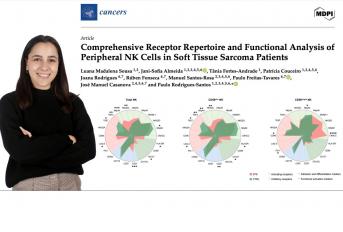Associação Portuguesa de Investigação em Cancro
Study reveals functional impairment of NK cells in soft tissue sarcoma
Study reveals functional impairment of NK cells in soft tissue sarcoma

Soft tissue sarcomas (STS) are a rare and heterogeneous group of malignant tumors, which makes their diagnosis and treatment particularly challenging. Available treatments remain largely ineffective for many patients, leading to disease progression and low survival rates.
Interestingly, although immunotherapy has its origins in sarcomas, for decades it was believed that these tumors were “cold,” meaning they had little immune cell infiltration. Today, it is known that the immune system plays a crucial role in STS. Nevertheless, studies focusing on the interactions between the immune system and these tumors remain scarce, knowledge that is essential for opening new avenues in the development of more effective immunotherapeutic strategies.
With this goal, researchers and clinicians at the University of Coimbra conducted a detailed analysis of Natural Killer (NK) cells in the blood of patients with STS. These cells, which act as a first line of defense by recognizing and eliminating tumor cells without prior activation, showed signs of functional impairment and a receptor repertoire distinct from that observed in healthy individuals.
Since this functional impairment may play a central role in disease progression, these findings pave the way for future strategies aimed at restoring the anti-tumor function of NK cells, thereby enhancing the immune system’s response against cancer.
Authors and Affiliations:
Luana Madalena Sousa1,2, Jani Sofia Almeida1,2,3,4,5,6, Tânia Fortes Andrade1, Patrícia Couceiro1,2,4,5,6, Joana Rodrigues6,7, Ruben Fonseca6,7, Manuel Santos-Rosa2,3,4,5,6, Paulo Freitas-Tavares6,7, José Manuel Casanova2,4,5,6,7, Paulo Rodrigues-Santos1,2,3,4,5,6*
1 University of Coimbra, Center for Neuroscience and Cell Biology (CNC), Laboratory of Immunology and Oncology, Coimbra, Portugal;
2 University of Coimbra, Center for Innovation in Biomedicine and Biotechnology (CIBB), Coimbra, Portugal;
3 University of Coimbra, Faculty of Medicine (FMUC), Institute of Immunology, Coimbra, Portugal;
4 University of Coimbra, Faculty of Medicine, Center of Investigation in Environment, Genetics and Oncobiology (CIMAGO), Coimbra, Portugal;
5 University of Coimbra, Faculty of Medicine, Coimbra Institute for Clinical and Biomedical Research (iCBR), Coimbra, Portugal; 5 University of Coimbra, Center for Innovation in Biomedicine and Biotechnology (CIBB), Coimbra, Portugal;
6 Clinical Academic Centre of Coimbra (CACC), Coimbra, Portugal;
7 Coimbra Local Health Unit (ULSC), University Clinic of Orthopedics, Orthopedics Service, Tumor Unit of the Locomotor Apparatus (UTAL), Coimbra, Portugal;
Abstract:
Background: Soft tissue sarcomas (STSs) are a rare and heterogeneous group of mesenchymal tumors with limited response to current therapies, particularly in advanced stages. STS tumors were traditionally considered "cold" tumors, characterized by limited immune infiltration and low immunogenicity. However, emerging evidence is challenging this perception, highlighting a potentially critical role for the immune system in STS biology.
Objective: Building on our previous findings suggesting impaired natural killer (NK) cell activity in STS patients, we aimed to perform an in-depth characterization of peripheral NK cells in STS.
Methods: Peripheral blood samples from STS patients and sex- and age-matched healthy donors were analyzed to assess NK cell degranulation, IFNγ production, and receptor repertoire.
Results: Functional assays revealed a notable reduction in both degranulation and IFNγ production in NK cells from STS patients. STS patients also exhibited dysregulated expression of activating and inhibitory NK cell receptors. Principal component analysis (PCA) identified CD27 and NKp44 as critical markers for distinguishing STS patients from healthy donors. Increased CD27 expression represents a shift towards a more regulatory NK cell phenotype, and we found that CD27 expression was negatively correlated with NK cell degranulation and IFNγ production. ROC curve analysis demonstrated strong potential to distinguish between the groups for both CD27 (AUC = 0.85) and NKp44 (AUC = 0.94).
Conclusion: In conclusion, STS patients exhibited impaired NK cell function, altered receptor repertoire, and a shift towards a less cytotoxic and more regulatory phenotype.
Journal: Cancers
Link: https://www.mdpi.com/2072-6694/17/15/2508




